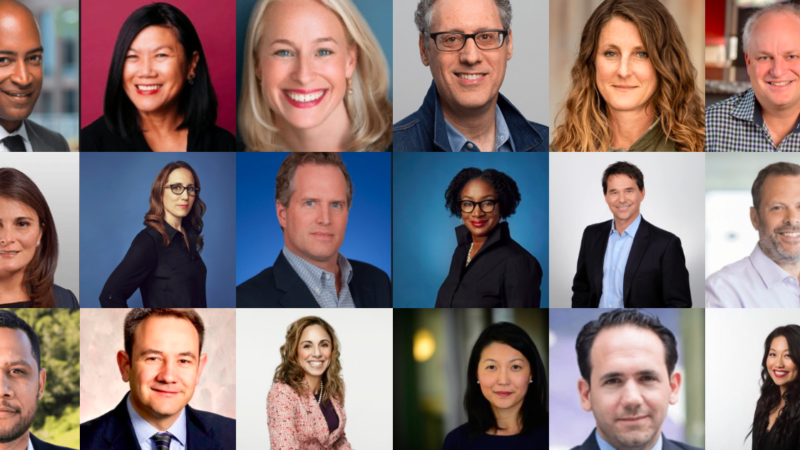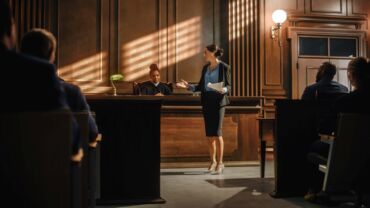In our latest "Upfront & Personal" column, we speak to Bjarne P. Tellmann, General Counsel & Chief Legal Officer of Pearson, about the value of curiosity
We continue our monthly feature, “Upfront & Personal”, a column created by Rose Ors that brings “the person behind the title” to the forefront in interviews with some of the most influential members of the legal community.
Bjarne P. Tellmann, General Counsel & Chief Legal Officer of Pearson PLC, spoke recently with Rose D. Ors, the CEO and Founder of ClientSmart, about the life moments that defined him, what you learn from moving around, and the value of curiosity.
Rose Ors: What life moments have defined you?
Bjarne Tellmann: My father was a Norwegian diplomat whose job required that our young family live in a number of different countries — France, Egypt, and back and forth between Norway and the U.S. In each new place, I had to learn the language and navigate being the new and different kid in school. It was a case of sink or swim, and in choosing to swim, I learned to adapt in a very deep way.
My family continued to move after I went to college, living in Argentina and Lithuania. I’ve continued this lifestyle, having lived in Los Angeles, Boston, Chicago, Stockholm, Helsinki, London, Frankfurt, Vienna, Athens, Tokyo, Atlanta and New York.
Rose Ors: Why do you think you decided to swim?
Bjarne Tellmann: It was a combination of necessity and will. I decided to become comfortable with being different. I decided I would handle each challenge by doing my best. I told myself, “All right, I’m just going to figure out how this all works.”
It was not easy to be an outsider at such a young age. But learning to adapt and being comfortable with change has given me great freedom later in life. It allowed me to follow my passions, even if that entailed wandering around a bit or not following the straight and narrow path.
Rose Ors: Tell me more.
Bjarne Tellmann: Being on the move at a young age enabled me to be comfortable taking what many would see as risks. But I welcome surprises and change in my life. My approach to life has let me go where my interests or chance opportunities have taken me.
I fell in love with acting by chance. In high school, a girl I had a crush on said, “Hey, you should be in the school play.” And I’m like, “Yes, definitely” and I joined the cast. That ultimately led to some film and TV work. Then I attended Boston University’s (BU) College of Fine Arts to hone my acting skills. I loved the experience but decided to switch majors and graduated with a political science degree.
In my final semester at BU, I became interested in living in London. That led to spending the semester as an intern for Merlyn Rees, a member of the House of Commons and the former home secretary and secretary of state for Northern Ireland. It was this internship that got me interested in staying on in London, so I remained and completed a Master’s degree at The London School of Economics. That in turn led me to The University of Chicago, where I fell in love with the law while taking my JD. I approached this period in my life, as I always have, with curiosity and openness.
That same curiosity and openness informed my choices after getting my JD. I worked in the European offices of White & Case and then Sullivan and Cromwell. But wanting to learn more about the world of business, I left Sullivan and started at the bottom of the totem pole as an in-house lawyer at Kimberly-Clark in London.

This was 20 years ago when it was not yet cool or prestigious to be in-house. From Kimberly-Clark I went to Coca-Cola where I spent 13 years saying “yes” to changing roles and working in London, Vienna, Athens, Tokyo and Atlanta.
Rose Ors: What have you found are the commonalities and the differences of these different cultures?
Bjarne Tellmann: Everywhere I’ve lived I found that people care deeply about the same fundamental things, such as their family and friends. They all want for their family and friends to thrive. I think the differences are rooted in the way different cultures manifest the same desires.
Rose Ors: What is an example in a business context?
Bjarne Tellmann: In all cultures trust is highly valued. In business everyone wants to trust the people they work with — what differs is how each culture arrives at establishing trust.
In Western cultures, you tend to trust someone because they are an expert. In a lot of Asian cultures, it is more about emotional trust: Do I trust you emotionally? Do I trust your judgment? This emotional trust gets built by getting to know each other over many dinners and drinks.
Rose Ors: What career advice would you give your 20 year-old-self today?
Bjarne Tellmann: Several years ago, I delivered the commencement address at the London School of Economics. The advice I shared at the commencement address is the advice I would give myself at 20. First, think like the CEO of “You, Inc.” and prepare a three-year business plan laying out your goals and how you plan to achieve them. Set measurable and achievable goals and work back from that.
Second, nurture chance encounters. The best things that happen to you in your life are not planned and not anticipated. The business plan should serve as a guide, but when opportunities in your life come along, don’t say no to them just because it wasn’t in your plan.
Lastly, think about what’s important in your life. David Brooks, the writer and thinker, framed it perfectly in his TEDTalk when advised us to live our eulogy not our resume.
Rose Ors: What person living or dead would you be thrilled to have over for dinner?
Bjarne Tellmann: It was difficult to choose just one person, but having recently read Walter Isaacson’s absorbing book on Leonardo Da Vinci, I would invite Da Vinci.
Da Vinci’s ability to move from art to science to philosophy is extraordinary. He had such an insatiable curiosity and hunger for knowledge. One of the coolest things about that book is it has these beautifully reproduced pages from his notebooks. There are about 7,000 pages of his notebooks still in existence. His habit was to scribble in a notebook all day. Some pages were full of disparate notes and sketches. For example, one page includes a mathematical equation in one corner and a sketch of one of his masterpieces — The Last Supper. The page also contains sketches of stone masonry and questions scribbled in the margin like, “I need to figure out how a woodpecker’s tongue is constructed.”
Rose Ors: What would you ask him?
Bjarne Tellmann: What was he more curious about and why? How did he go about seeking so many areas of knowledge? Lastly, why did he leave so many projects unfinished?
Rose Ors: What advice would you give a newly appointed general counsel?
Bjarne Tellmann: I wrote a book a few years ago called Building An Outstanding Legal Team: Battle-Tested Strategies from a General Counsel. In the book, I share three pieces of advice.
First, act like the CEO of your legal department. This means you must wear two hats. One is the hat of the profession of law legal advisor, providing the board, the CEO and the company with sound legal advice. The second hat is that of a business of law executive, which requires that you deliver legal services at an optimal quality and cost for the business. To do this, you have to start with what I call the “hardware”, that is to say, focusing on the tangible, measurable aspects of running your business, including risk identification, people, process, budget, vendor management, and technology in a manner that optimizes cost and service delivery, adding value to the company.
Second, once you have achieved wins on the “hardware” front, you must focus on the “software” — the less tangible but equally critical aspects of culture, leadership skills, and diversity. This also includes developing and reinforcing a value-add culture and recruiting and developing legal leaders who have the personal qualities and technical skills to run high-performance teams.
Your success will largely depend on your ability to establish and lead a diverse team of professionals who know they are valued and accountable. But you have to focus on both the hardware and the software.
Lastly, the entire time you are building out your hardware and software, you must focus on what I call the “constants”. These include developing a strategic roadmap to guide you and your team. Before you set out on a journey, know what your destination looks like and how you plan to travel there. Have in place a solid mission and strategic priorities that are aligned with the company’s vision and designed to get you to your destination.
Similarly, understand the concepts and tools of change management. Change is inherently an emotional process and it is important to account for this before trying to transform how people work. Too often as lawyers we get excited by the “how” and we rush off to tell our teams “this is how we are going to change”. Yet most of the team is silently asking themselves “yes, I get the “how” but why are we changing?” You need to address the “why”, telling stories that resonate and highlight the need for the change you are advocating.
You have to bring people with you, which means dealing with their emotions, including excitement, fear, grief, and resolve. Changing an organization is a lot like moving to a new country. It is at heart an emotional process.







